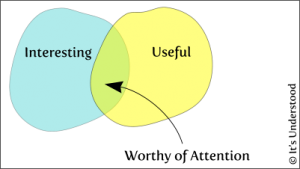Attention, focused and conscious thought, is a scarce resource. It requires effort and consumes energy – something our brains strive to minimize.
It’s further constrained by the number of waking hours we have. We only have so much time in which to express ourselves and do things that matter. Yet, without fail, a multitude of things manage to distract us from the things we really want to achieve.
In today’s “always on” environment these distractions seem to multiply and the opportunity to dilute our attention is usually only a click away. There are so many sources of practical advice on how to focus, from time management practices to “Getting Things Done” frameworks, that it seems we have no excuse to be distracted – but it happens.
How then to decide what to do? Here’s an interesting question to ask yourself before (or while) you disappear down a rabbit hole following a unplanned thread of activity: “Is this interesting or is this useful?”
I happen to be interested in many things and love to explore ideas and connections between them. My wife and business partner calls me an “info lush.” This is highly entertaining (for me) and sometimes yields useful discoveries or insights, yet it’s often dysfunctional in the broader context of life.
 What, then, is worthy of our attention? Or, more to the point, the attention of folks you want to help. Clearly the intersection of these two sets, the interesting and the useful, is where we should focus.
What, then, is worthy of our attention? Or, more to the point, the attention of folks you want to help. Clearly the intersection of these two sets, the interesting and the useful, is where we should focus.
I know it’s difficult at times to place ourselves on the “interesting versus useful” scale, but simply being mindful of the distinction and and asking the question can us help decide where to spend our most precious resource – our attention.
If we take this economic view, we can decide to spend our limited attention resource where it will have the greatest return. Isn’t that a worthy goal?
